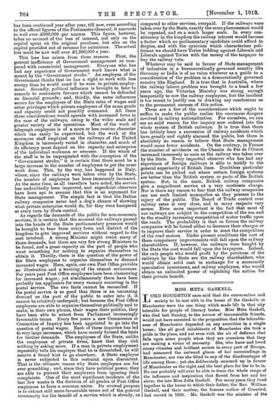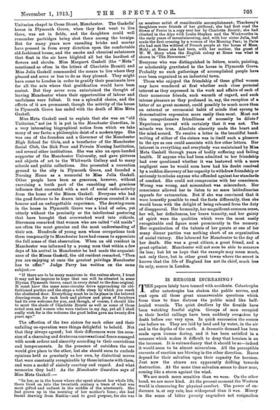MISS META GASKELL.
TORD HOUGHTON once said that the conversation and society to be met with in the house of the Gaskells at Manchester were the one thing which made life in that city tolerable for people of literary tastes. Miss Meta Gaskell, who died last Sunday, to the sorrow of innumerable friends, would not have assented to the proposition that the tolerable- ness of Manchester depended on any amenities in a single house; like all good inhabitants of Manchester she took a pride in the place, and not even with the air of defiance that falls upon some people when they are conscious that they are making a virtue of necessity. She, who knew and loved sunny climates and brilliant scenes in every part of Europe, had measured the outward gloom of her surroundings in Manchester, nor was she blind to any of the disadvantages of life among them ; yet she deliberately summed up in favour of Manchester as the right and the best place for her to be in. No one probably will ever be able to trace the whole range of the influence and inspiration that flowed from her and her sister, the late Miss Julia Gaskell. For many years they lived together in the house to which their father, the Rev. William Gaskell, and their mother, the famous author of Cranford, had moved in 1850. Mr. Gaskell was the minister of the.
Unitarian chapel in Cross Street, Manchester. The Gaskells' house in Plymouth Grove, when they first went to live there, was set in fields, and the daughters could well remember partridges being shot there among the turnips. But for many years now unending bricks and mortar have pressed in from every direction upon the comfortable old-fashioned house, and the smoke and chemical substances that float in the air have blighted all but the hardiest of flowers and shrubs. Miss Margaret Gaskell (the "Meta " mentioned so often in the letters of Charlotte Brontë) and Miss Julia Gaskell commanded the means to live where they pleased and more or less to do as they pleased. They might have come to London in order to gratify their passionate love for all the arts where that gratification would have been easiest. But they never even entertained the thought of leaving Manchester where their opportunities of labour and usefulness were fullest. It was a splendid choice, and the effects of it are permanent, though the activity of the house in Plymouth Grove has ended with the death of Miss Meta Gaskell.
Miss Meta Gaskell used to explain that she was an "old Unitarian," not (as it is put in the Manchester Guardian, in a very interesting biographical notice from which we take many of our facts) a philosophic deist of a modern type. She was one of the founders and a Governor of the Manchester _High School for Girls, and a benefactor of the Manchester Social Club, the Sick Poor and Private Nursing Institution, and several other institutions. She was also an open-handed supporter of the Manchester University, and gave pictures and objects of art to the Whitworth Gallery and to many schools and public collections. She presented a recreation ground to the city in Plymouth Grove, and founded a Nursing Home as a memorial to Miss Julia Gaskell. Other people have been as generous, however, without exercising a tenth part of the ennobling and gracious influence that emanated with a sort cf social radio-activity from the home of the Misses Gaskell. Everyone who had the good fortune to be drawn into that system counted it an honour and an unforgettable experience. The drawing-room in the house in Plymouth Grove was a kind of salon, yet utterly without the preciosity or the intellectual posturing that have brought that overworked word into ridicule. Stevenson remarked that women who are called "old maids" are often the most genuine and the most understanding of their sex. Hundreds of young men whose occupations took them temporarily to Manchester have had reason to appreciate the full sense of that observation. When an old resident in Manchester was informed by a young man that within a few days of his arrival in Manchester he had made the acquaint- ance of the Misses Gaskell, the old resident remarked, "Then you are enjoying at once the greatest privilege Manchester has to offer." Judge Parry has written on the same subject :—
"If there are to be many mansions in the realms above, I trust it may not be impious to hope that one will be situated in some Elysian Plymouth Grove, exact in every detail to the dear original. It must have the same semi-circular drive approaching its old- fashioned portico and the steps a trifle steep by which you reach the shuttered door. Everything must be in its place in the beloved drawing-room, for each book and picture and piece of furniture had its own welcome for you, and though, of course, I should like to meet the shade of Charlotte Bronto as well as some of those noted men and women who were visitors in ray day, yet all I shall really wish for is the welcome the good ladies gave me twenty-five years ago."
The affection of the two sisters for each other and their unfailing co-operation were things delightful to behold. Not that they always agreed; but their differences were the occa- sion of a charming and dexterous conversational fence managed with muola ardour and sincerity according to their convictions and temperaments. In the presence of outsiders the one would give place to the other, lest she should seem to exclude opinions held as genuinely as her own, by dialectical moves that were constantly recognizable by those intimate with them, and were a model of sisterly courtesy and regard. And what memories they had! As the Manchester Guardian says of Miss Meta Gaskell
"In her, as in the house where she spent almost her whole life, there lived on into the twentieth century a trace of what was most gifted and radiant in the middle of the nineteenth. She had grown up in the morning of her mother's fame ; she had learnt drawing from Ruskin—and to good purpose, for she was an amateur artist of considerable accomplishment ; Thackeray's daughters were friends of her girlhood; she had first read the Stones of Venice in a copy sent her by Charlotte BrontS; she had climbed in the Alps with Leslie Stephen and the Winkworths in the early years of mountaineering, and, with her sister Julia, had made the first crossing by a woman of the Morning Pass; in Paris she had met the wittiest of French people at the house of Mine. Mohl ; at Rome she had been, with her mother, the guest of W. W. Story when the English colony at Rome was what is shown in 'The Newcomes."
Everyone who was distinguished in letters, music, painting, or scholarship gravitated to the house in Plymouth Grove. Probably no such gatherings of accomplished people have ever been organized in an industrial town.
Those who enjoyed the friendship of these gifted women may have wondered at first whether such close personal interest as they expressed in the work and affairs of each of their numerous friends, such warmth of regard, and such intense pleasure as they professed in, say, the reception of a letter of no great moment, could possibly be much more than an external or ceremonial habit of minds that sprang to demonstrative expression more easily than moat. Must not this comprehensive friendliness of necessity be dilute ? Experience proved with certainty that it was not. The miracle was true. Absolute sincerity made the heart and the mind accord. To receive a letter in the beautiful hand- writing of either of the sisters was in itself such a pleasure to the eye as one could associate with few other letters. Her interest in everything and everybody was maintained by Miss Meta Gaskell through years of bodily suffering and failing health. If anyone who had been admitted to her friendship had ever questioned whether it was bestowed with a mere negligent ease he would soon have had his doubt resolved by a sudden discovery of her capacity to withdraw friendship or seriously to rebuke anyone who offended against her standards of conduct. She could not compromise with her conscience. Wrong was wrong, and misconduct was misconduct. Her conscience allowed her to listen to no mere latitudinarian appeals for extenuation. But if she was convinced that it were honestly possible to read the facts differently, then she would beam with the delight of being released from the duty of disapprovaL Her humanity, her magnificent common sense, her wit, her definiteness, her brave tenacity, and her gaiety of spirit were the qualities which were the most easily recognizable and figure most prominently in the memory.
Her organization of the talents of her guests at one of her many dinner parties was nothing short of an organization of social victory. She laboured for Manchester to the day of her death. She was a great citizen, a great friend, and a
great optimist. Manchester will not soon be able to measure its loss ; but let us hope that the example may mean much,
not only there, but in other great towns where the secret is known that the life of England has not its chief, much less its only, source in London.































































 Previous page
Previous page